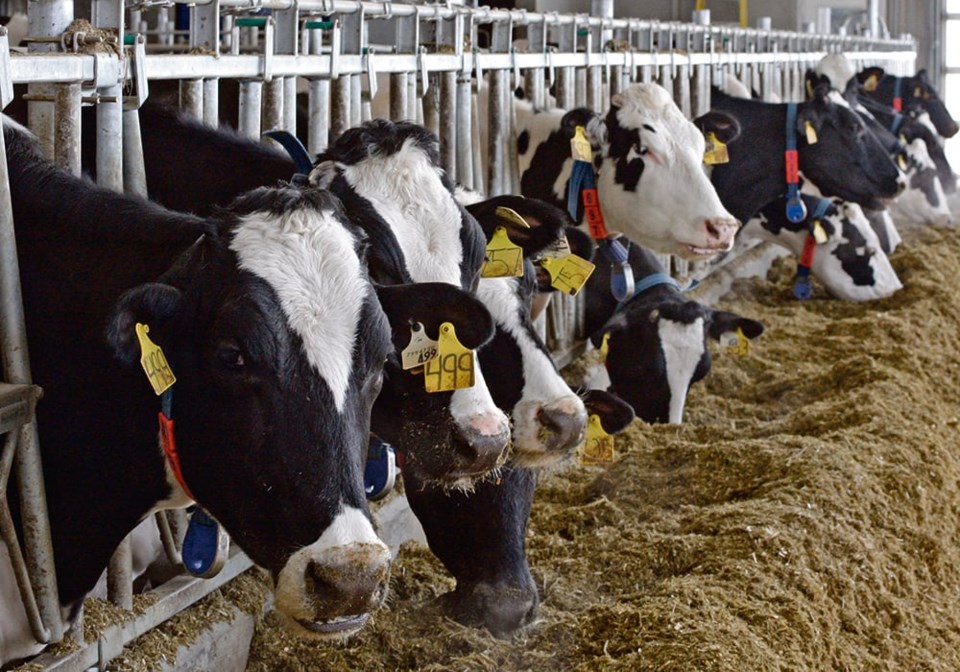WESTERN PRODUCER — A feed ingredient designed to reduce methane emissions in beef and dairy cattle has received market approval in Canada.
Bovaer neutralizes methane in the rumen. When microbes in the rumen break down feed, hydrogen and carbon dioxide are released. These two gases are combined in the presence of an enyzme. Bovaer works by suppressing the enzyme and reducing the amount of methane that is created.
Dsm-firmenich, the Dutch company selling the product, says it could be available in Canada within a few weeks.
for farmers to reduce methane emissions for cattle, but Canadian research has also shown a small increase in feed efficiency and no change in cattle growth rate.
“This will benefit Canadian farmers, efforts of the sector and support Canada in delivering on its international emissions reduction commitments ,” said Mark van Nieuwland, vice-president of Dsm-firmenich’s Bovaer branch.
Canadian cattle feeders can reduce methane emissions by an average of 45 percent by using the ingredient, the company said.
In the case of dairy cows, Bovaer can “reduce methane emissions by 30 percent on average, potentially lowering the overall greenhouse gas footprint per litre of milk by 10 to 15 percent.”
A large trial run in Alberta provided Canadian data to support the additive’s approval.
“In 2020, Dsm-firmenich successfully completed the longest and largest trial with Bovaer,” said van Nieuwland.
“(It was) a two-year trial with 15,000 beef cattle in Alberta and supported by ERA (Emission Reduction Alberta), which demonstrated methane reductions of up to 82 percent, resulting in savings of 1,473 tons of CO2e during this study alone.”
The company said that once the product is included as a tool in programs such as the Reducing Enteric Methane Emissions protocol for beef cattle and the Alberta Fed Cattle protocol, cattle feeders will also be able to generate carbon offsets from its use.
The authorization comes on the heels of the Canadian Food Inspection Agency approving 3-Nitrooxypropanol (3NOP), the active ingredient in Bovaer , earlier this week.
“We are very pleased to see the regulatory pathway open for innovative feed ingredients that reduce methane emissions which will contribute to our sector meeting its 2030 emissions goal,” said Nathan Phinney, Canadian Cattle Association president.
“We applaud the CFIA for their diligence on this file to ensure this new tool is available, which will allow Canadian beef producers to remain competitive globally.”
According to the news release from the CCA and the National Cattle Feeders’ Association, 3NOP has shown no negative impacts on the rumen microbial population when fed to cattle.
The Canadian beef industry has set a goal to reduce primary production greenhouse gas emissions intensity by 33 percent by 2030. Dairy Farmers of Canada has a goal of net zero emissions by 2050.
Karen Beauchemin, a retired Agriculture Canada research scientist, was a key player in the Canadian research.
“I think beef producers are interested in doing their part, but just focusing on enteric methane emissions is not going to get Canada where it needs to be by 2030,” Beauchemin said in .
Enteric methane emissions from cattle contribute 3.3 percent of Canada’s total greenhouse gas emissions.
“One thing I find with consumers is they have a real misconception about how much enteric methane from animals contributes to our national greenhouse gas budget,” Beauchemin said in the article.
The product has been approved in more than 50 countries in the world, but as of early 2024, not yet in the United States.




